Unity Gaming Crisis: the problem with vendor lock-in in game development
This article has been published in cooperation with the RIAT Institute for Arts and Technology. Opengears works with RIAT Institute as research fellow. Follow opengears on medium, and on twitter to keep in touch.
The Unity Technology Gaming Crisis
After the announcement of Unity in September 2023 that they would change their pricing model, developers have been fighting back. There are boycotts, petitions, open letters, and a few extreme positions forcing the company to close offices due to ‘credible death threat’. Bloomberg described the situation as “Unity Technologies Destroys Its Goodwill With Developers” and note that “Unity has since tried to clarify aspects of the policy, saying that it will impact less than 10% of users and won’t apply to charity bundles or reinstalls”, but the damage has been done. How can developers and indie studios basing their businesses on Unity ever trust them again? How much risk should one take in the gaming industry, and what strategies to de-risk could be taken?
Unfortunately the current crisis is “just history repeating”, and we are entering the next phase of vendor lock-in. Jonathan Zittrain in his text “The Generative Internet” (2006) has famously noted that the openness of the internet is at stake. In 2008, he criticized “tethered appliances” stifling the innovation that led to the rise of the world wide web. In his 2009 book The Future of the Internet — and How to Stop It (Yale University Press), Zittrain has foreseen the centralization of web 2.0, and the problems that platforms and their tethered appliances would bring. Looking from the perspective of 2023 it looks like a long path downwards. Game development platforms, distribution, and consumption are all centralized and possible monopolies, and they are uncontested in 2023. The mobile sector (which is the biggest game platform and market) is an uncontested monopoly without a relevant open source alternative. New and indie game developers have the challenging task to have a clear cut business plan and remunerate their games fast. With all the backlash from Web3 gaming, Unity contributes to a general market sentiment which is positioning itself against the experiences and learning from past success stories in gaming.

“Here is the gist. Starting January 1st, 2024, all games that use the Unity engine will be charged 20 cents (USD) for each game installation, once it hits a threshold of 200,000 downloads and $200,000 in revenue. A lower charge and a higher starting threshold — $1 million in sales and a million installations — will be offered for higher tiers of Unity subscriptions, starting at around $2000 a year.” (Source: PCworld)
At the key of all the rage and chaos lies the fact that Unity introduces a novel “per install pricing”. The fees ca $0.20 per install affect large chunks of the industry — and are posing a threat to free-to-play and small studios, which are not yet established. It is also a big problem for existing and older free online games, as they would have to pay for their existing installs suddenly.

A tldr of the online discussion, and some of the voiced concerns
These recent changes made by Unity Technologies have caused an uproar in the game development community (particularly indie developers who already face challenges in a competitive market).
Re-installs and Hardware Changes: If a user re-installs a game or changes their hardware, it will count as multiple installs, and the creator will be charged for each install. Unity justifies this by stating they only receive aggregate data and not end-player information.
Demos and Early Access: If a game has a demo, early access, or beta version, installs of these versions will also incur a charge. This means developers will be charged for people playing their demos as well.
Pirated Copies: Concerns arise about developers being charged for pirated copies of their games. Unity claims to have fraud detection practices in place and will allow developers to submit concerns about potential fraud. However, the presenter is skeptical about Unity’s ability to effectively combat piracy, especially given the rapid spread of pirated games on various platforms.
WebGL and Streamed Games: Games on all platforms, including WebGL and streamed games, are eligible for the fee. The presenter questions how Unity will determine the earnings of web games, especially those that generate revenue through ads rather than direct sales.
Existing Games: The new fees will apply to games that have been out for years, as long as they distribute the Unity runtime.
I have spoken to people who have been using Unity for 12+ years and have lost faith in the company due to these changes. Some of them are directly affected, and are considering taking their games offline.
Vampire survivors would not even be possible with Unity pricing structure (but it recently switched to Unity Engine)
Vampire Survivors has been dubbed “best game of 2022” by Rock Paper Shotgun. The game became famous and big by introducing pricing of $0.99, and the success story is unprecedented.
The game currently is available for platforms macOS, Windows, Xbox One, Xbox Series X/S, Android, iOS, and Nintendo Switch. Here is a free online version you can play on itch.io in case you never played it. The game received accolades at the Golden Joystick Awards, New York Game Awards and D.I.C.E. Awards. The game was nominated in five categories at the British Academy Games Awards, of which it won in two: Game Design and Best Game (source: Wikipedia).
Would an indie game like Vampire Survivors even be possible to work from an economics perspective with the recently changed fee structures of Unity? After all poncle (the dev behind Vampire Survivors) started with the Phaser framework, and just recently moved to Unity.
[..]we know what to expect when the public version of Vampire Survivors officially switches over to Unity on August 17th, as recently confirmed by Poncle. As per testers’ time with the new engine during its beta, the Unity version runs a lot smoother than the original — keeping the framerate close to 60 even as the screen fills with enemies and explosions — and is generally more stable, avoiding slowdown. (RockPaperShotgun)
Vampire Survivors is a game that has been used by many as “case study” and example to be built with Unity (see udemy, medium, and many more). Sorry for all the people who have put hours of free work into free marketing for a company that in the blink of an eye changes their stance towards fair use. The example of a “roguelike” such as Vampire Survivors is a bad starting point — but not because of the tech, but because of the updated general economic model of Unity: it dis-incentivizes success stories, and forces games into having fast economic turnaround. Maybe Unity Technology does not know about all the hate that Web3 gaming recieved? Or how promises of Web3 gaming has kept a huge part of Gamers in the Philippines in debt?
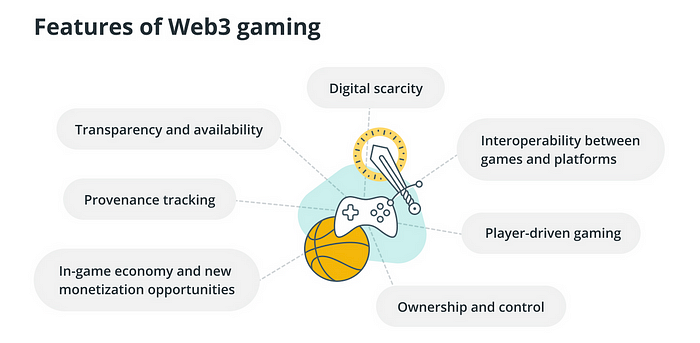
How much Vampire Survivors would cost after the Unity fee structure changes of 2023
- Steam, as a platform, takes a 30% fee.
- Unity then charges 20 cents per install.
This means that for a 99-cent game, after deducting Steam’s and Unity’s fees, the developer is left with a maximum of 46 cents on the dollar. If a publisher is involved, which typically takes another 30 to 40 percent, the developer would end up with only around 20 cents for every dollar earned from the game.
There are a lot of online discussions about this topic, and there also have been breakdowns of the different fee structures and scenarios in which Vampire Survivors all would have been still a success. Most of them are missing the point: the success of Vampire Survivors was based on pricing! It has been a hack in terms of crowd appreciation. It just would not have worked with a higher price. (Source: over 30 individual interviews undertaken with market participants).

The argument is: the current pricing model of Unity kills hobbyist game developers, and disincentivizes to make great games: if your game goes viral you are broke.
Sadly, the global game development situation is not in the best condition overall, so the added complication of Unity is just the tip of the iceberg.
The vendor lock-in problem
An alternative engine (no matter how good) doesn’t solve vendor lock-in. Gamedev is a cutthroat business. You can’t afford a rewrite. Even for new productions, you can’t throw away engine experience and start retooling. I expect backlash. (rollcat on news.ycombinator)
Could the most obvious winner from the Unity Gaming Crisis be Epic Games with their Unreal Engine? Short answer: Yes.
And since you asked: Yes, you can build Vampire Survivors in Unreal Engine.
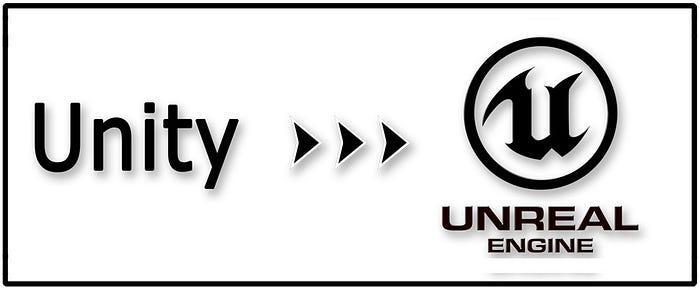
Firstly, from a macro perspective the change in Unity >> Unreal would regard future developers, companies and games, as there is no easy way of changing your existing stack, team and knowledge so quickly. Unity uses C# as its native programming language in both in the Unity editor and in additional plugins. Unreal Engine uses C++ as its native programming language. Porting over a game takes significant time, resources, and planning.
The good parts: Unreal Engine is available for Linux, and it is free to use for small and indie games (making less than $1M USD revenue), for linear content (such as movies) and for “internal projects”. This is great, and here is a description about royalties via GameDevAcademy on YouTube.
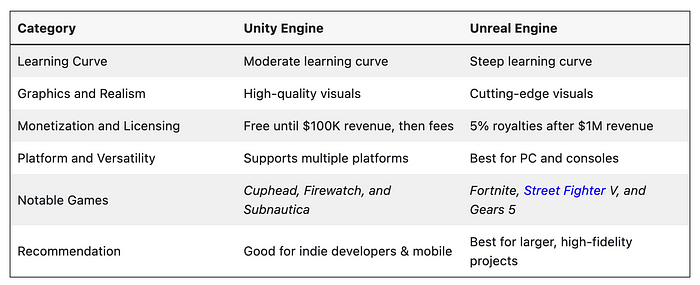
But here is the problem: who prevents Epic from ever pulling the same trick as Unity Technology just recently did?
On the one hand I want to say: let’s avoid vendor lock-in, but the times of vendor lock-in have reached their pinnacle — how can we ever escape the platform centralization? As Jonathan Zittrain wrote in his book The Future of the Internet and How to Stop It: “a certain incompleteness in design, and corresponding openness to outside innovation — is both the cause of their success and the instrument of their forthcoming failure”.
The sad truth of device vendor lock-in
“The personal computer is dead” (Jonathan Zittrain)
- The Apple iPhone is completely locked down (and the main revenue driver for Apple). In 2022, there were more than 120 million iPhone users in the United States (source). iPhones have a 57.77% market share in the US smartphone industry as of Q2 2023 (source).
- Mobile and console games make up over 79% of the total market these are all super proprietary. There are no significant open devices in either categories (not talking about Linux Phones, iOS jailbreaking, or open-source handheld video game consoles — all which are fringe and in the minority).
The only current option for “device independence” are Linux-capable devices. But the market does not care. Gamingonlinux tracks approximated amount of Linux gamers, and 2,402,400 estimated “monthly active users” for Linux+Steam. You can run Steam OS on your pc or laptop (but it came a long way). Overall this is a too small amount of market that you would not take into account as a game developer. Why artificially limiting your addressable market?
Vendor lock-in of app stores

App stores are the main distribution channels for games in 2023. Some App stores are considered more closed than others, and Apple’s App Store is often considered a “walled garden”, as it permits third-party apps such as Amazon’s App Store (which in itself is another App store). The Epic Games v. Apple case from 2021 had challenged Apple’s restrictions on apps from having other in-app purchasing methods outside of the one offered by the App Store. The Epic Games v. Apple cases are quite complex, and here is a good overview.
Chris Anderson wrote 2010 in Wired Magazine that “as much as we love the open, unfettered Web, we’re abandoning it for simpler, sleeker services that just work”. His observation was about the increased use of Internet vs. the Web: “You’ve spent the day on the Internet — but not on the Web. And you are not alone”. He observed that more people started to use interconnected devices such as the iPad, and App stores were on the rise. This rise of the app stores came at the expense of tinkerers, developers, and freedom. You are just losing the next part of the cake, this one was expected. What to learn from this: understand the risk of vendor lock-in.
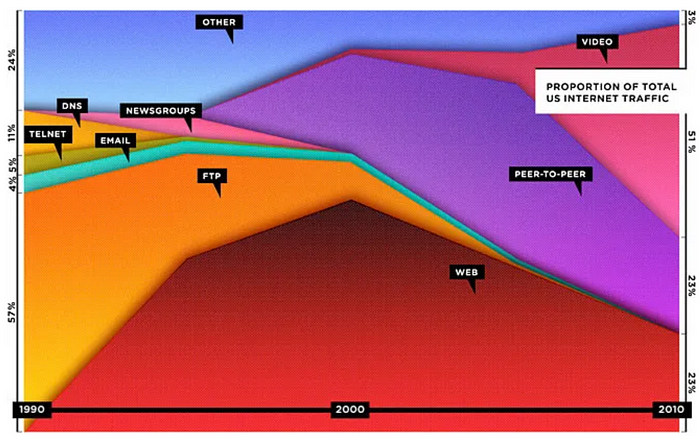
Why this all matters: gaming = mobile casual (and a few statistics to back this up)

- Gaming is not a niche anymore. There are approximately 3.09 billion active video gamers worldwide in 2023.
- China has the most video gamers in the world, with 742.19 million players. China’s gaming market generated $45.77 billion in revenue in 2022. (source)
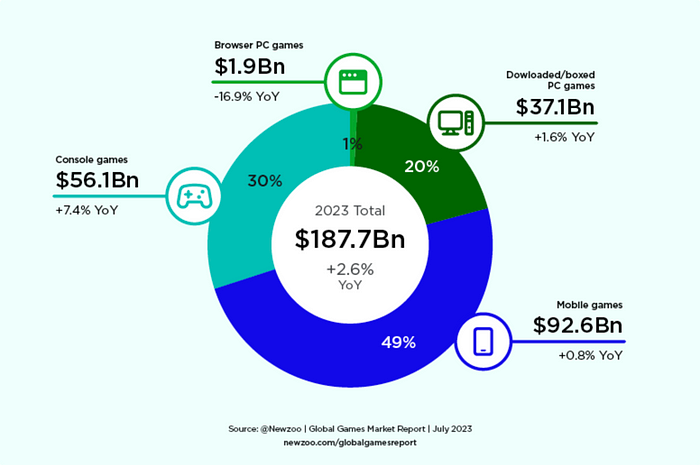
- Mobile games are the biggest gaming niche (by far), with 49% of the total market share. 25% of these games are “hyper-casual games” (source: businessofapps.com)
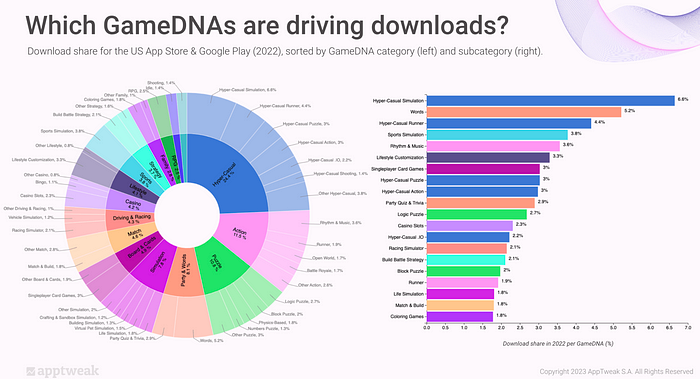
- According to statistics from SensorTower 2022, the leading genres in mobile gaming (in terms of consumer spend and downloads) could be all considered “casual”.
Any engine you pick should be focused on your target audience, and target technology platforms. Chances are high you will want to publish for mobile devices (as it is the largest market). Casual games are the largest games category. Unreal Engine supports publishing to iOS and tvOS devices.
Alternative game engines
If you are a game developer just starting out, or a small indie studio that could pivot from Unity: do it.
“Changing game engine isn’t as simple as changing distribution platform. […] this is the skeleton of your game. […] Changing game engine is a monumental task” (Rhykker)
Teams that have Unity games in development are potentially screwed, as they might not have the liberty to migrate engines. New projects that can still move away from Unity should do it. The reason is quite simple: unless you have an old account you won’t get the same “cheap” rates, and it will just not make sense for you to build up on top of it. Also, you should focus on a technology stack that supports your own pace.
Depending on your risk adversity you can go with Epic’s Unreal Engine or with Open 3D Engine (O3DE). O3DE is under Apache 2.0 license, and is a Linux Foundation project.
If you are brave, or want to stay “independent” (the long form of indie), you can try the following cringe approaches (all open source projects and game engines).
C#
- Stride Engine (formerly Xenko) is an interesting alternative to Unity, and can also be developed in C#. It is described as “an open-source C# game engine for realistic rendering and VR”. License is MIT.
- Godot introduced C# support starting from v3.0 using the Mono .NET framework. MIT license.
- Armory 3D is available under the zlib/libpng License. Armory as a Blender add-on provides a full Blender 3D integration. There are great tutorials on the Armory 3D Community Channel on YouTube.
C++
- Panda3d is a “powerful, mature open-source cross-platform game engine for Python and C++”. Modified BSD license.
- Cryengine collects 5% of “gross receipts”. While this would work for non commercial projects, you would
- Epic’s Unreal Engine is mainly interfaced with C++. You can read details about the license on their website.
Rust
As of 2023 there are 41 Game Engines (“2D and 3D engines and frameworks”) published based on the Rust programming language. Some popular Rust game engines include Amethyst, ggez, and Bevy. You can see a full list on the site arwegameyet.rs.
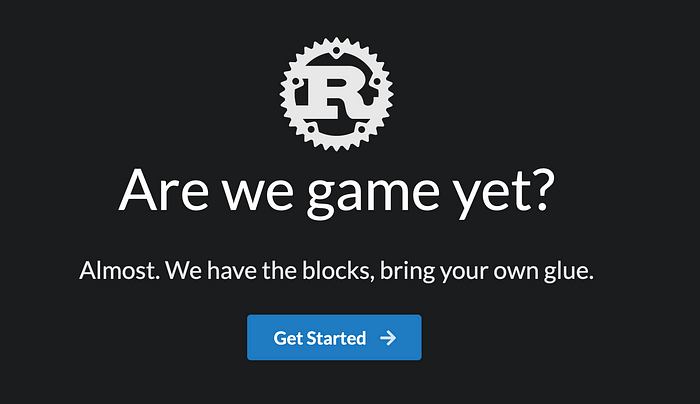
Conclusion
Unity’s IPO filing from 2020 has revealed their massive userbase: two billion monthly active end users, and 1.5 million creators (source: TheVerge). These are significant numbers, but the recent pricing changes of Unity will drive users to other game engines and platforms. If you are affected by the price changes your options are limited, depending on your investment in the Unity platform.
As described in the article, problems of the gaming industry are larger than only the games engines, and platforms and app stores are all closed down walled gardens. Game development studios need to distribute risk across app-stores and distribution channels, and there should be space for non-profit innovations and experiments.
The current events with Unity Technology show us how important it is not to let the big platforms dominate and monopolize the market. Actions such as change of the pricing model of Unity mainly hit small studios, small companies and not-for-profit games. In already uncertain times, actions such as these are contributing to less competition. In the case of Unity Technologies: let’s not forget that this is a publicly traded company, and we might see a backlash in share price soon.

READ ON: opengears.medium.com
This article has been published in cooperation with the RIAT Institute for Arts and Technology. Opengears works with RIAT Institute as research fellow.
Please follow me on medium & on Twitter @audiores and let me know in the comments if you have any other feedback or additions to this write-up. You can read more of my hardware and gear suggestion on my list Tools and services for the Nomad Nerd.
This work is licensed under a Creative Commons Attribution-ShareAlike 4.0 International License. You have to keep my original links in your derived work, and you have to link to opengears.medium.com if you are republishing.
